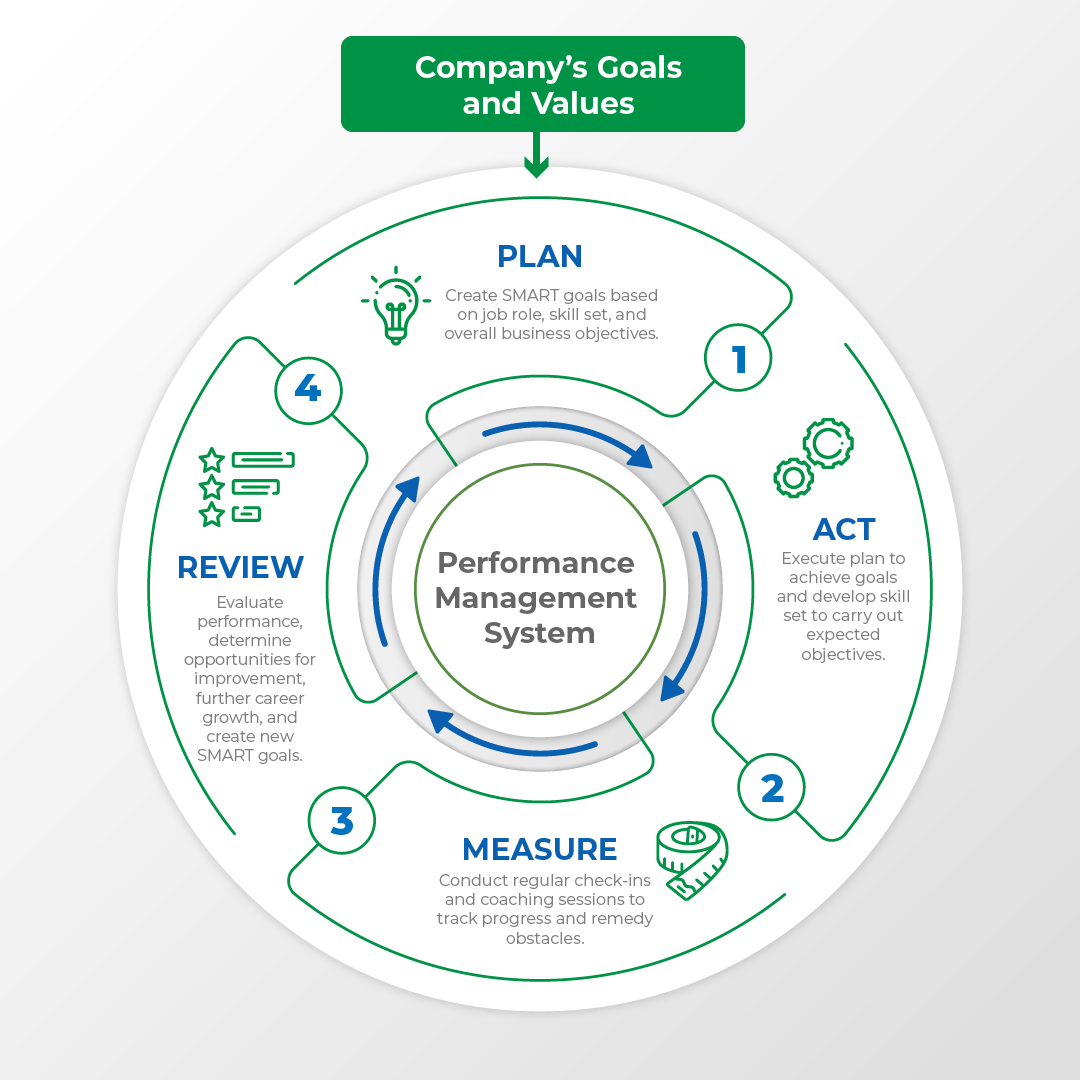Business is booming in the title and real estate industry, but are you managing that growth in a way that fits the overall vision, mission, and goals of your organization? Performance management is a term used by a lot of HR managers to emphasize systematic ways of implementing goal-setting, progress reviews, real-time feedback, training, and rewarding good work.
Managing performance requires clear goals and the right incentives. This is an ongoing process for every professional in every industry.
An effective performance management system has some of these characteristics.
Clear Goals
SMART goals are Specific, Measurable, Achievable, Relevant, and Timely. Setting goals that reflect each part of this acronym can help guide any organization regardless of size, industry, or services and products sold.
- Specific – goals should be specific or significant to each individual’s role and guided by these “W” questions: Who is involved? What do they need to accomplish? Why is it important? Which resources are required or limited? These questions help motivate and better understand the next steps taken.
- Measurable – goals should be quantified and tracked via metrics valuable to your organization. Sales metrics like revenue or average lifetime value of a customer should be measured against your company’s past performance and industry-wide benchmarks.
- Achievable – Goals have to be realistic. Consider constraints like time and budget before setting the bar too high. This may also require you to ask if you have the right team with all the right skill sets to accomplish the goal.
- Relevant – What contribution does the goal make to the overall goals of the organization? Does the goal match the skills and qualifications of the person responsible for achieving it?
- Timely – every SMART goal has a deadline. Without a target date in mind, goals will languish and motivation will atrophy.
Join this webinar and learn how to create your own performance management system!
The SMART goal formula:
The formula should contain what you will do, when you will do it, and how you will accomplish it. It should look something like this: By (a period of time), I will (achieve goal) by (increasing specific metric) by using (materials/resources).
Example: By the end of the quarter, I will increase organic blog traffic by 8-10%, reaching a total of 20,000 sessions in September by using a new backlink strategy.
SMART goals are a classic tool applied to business, but it works in life too. If you have a dream vacation, home, or job you want, try creating a plan that’s specific, measurable, achievable, relevant, and timely. If one aspect is off, how can you reimagine your dream as a SMART goal so it’s doable?
Goals aren’t just for individual employees. Each goal should represent a building block that contributes to the overall department goals that align with your organizational goals.
- Organizational
- Departmental
- Individual
It all starts from the top. The goals and values set by the leaders of the organization will kick off the cycle of performance management. Some experts have proposed an expansion of SMART goals into SMARTER goals to reflect the importance of Evaluated and Reviewed.
After reviewing performance, goals may need to be adjusted accordingly or new goals may need to be set in order to achieve optimal growth.

The Right Incentives
Communication, compensation, and culture are all ways to incentivize and inspire employees to reach their goals. Incentives don’t always have to be monetary, but without a good balance of the three that suit your team members, your organization will struggle with retaining good employees.
Ongoing communication
Oftentimes, many leaders will emphasize the review part of performance management, but the act and track stages are even more important as this is where the performance is actively delivered. Instead of taking a wait-and-see approach, managers will get better results from their teams if they regularly schedule time to check in with each employee.
Goals aren’t enough. They need to be understood and accessible for those assigned to accomplish them. Proactive and frequent feedback helps keep employees confidently on track, especially during a crisis. While some employees may have adjusted well to the new norm created by the COVID-19 pandemic, others may be distracted and struggling. Keep this in mind and create the space for employees to share these anxieties.
Compensation
One of the biggest challenges in the title industry is recruiting and training employees. The industry isn’t well known to young recruits, and the industry workforce is one of the oldest. This means that compensation and benefits packages are important to retain the employees you work hard to hire and train.
ALTA’s Compensation Index helps those in the title industry determine if their salary and benefits reflect what their peers offer.
Other benefits include a remote work option and more flexibility with work schedules. Hear how title companies like Patten Title Company apply a digital-first approach to enable remote work and better digital closing options for their customers.
Culture
Every workplace develops a culture whether you want it to or not. It happens organically, so some purposeful actions are required to mold it into a reflection of your company’s goals and visions.
Leaders play a pivotal role in setting the tone of a company by how they communicate the vision and values of the company. As companies grow or circumstances like the COVID-19 pandemic change working conditions, leaders may find the culture can change and grow in unexpected and rewarding ways.
Monday morning company updates at PropLogix are made a little more fun by the surprising facts Project Manager, Tyler Neumann, shares with us like the intelligence of fungus or the fluorescence of deep-sea fish. Cultivating a culture of curiosity and learning helps keep people engaged and connected despite the distance created by remote work.
If your company has recently hired an influx of new recruits or implemented remote work, now is a good time to step back and evaluate what sort of culture is emerging. In an office environment, this is easy to do: simply take a look around. However, if the majority of your team is working remotely, shaping company culture presents new challenges.
These tips from Workable on building a remote work culture from scratch can help you tackle them.
Implementing your Performance Management Plan
There’s a lot more to creating and sustaining a performance management system in your company. If you need help putting all this together and tips on how to implement and assess your plan, join Aubri Holler this week for Learning to Drive Performance for Your Title Company and Achieve Your Goals.










